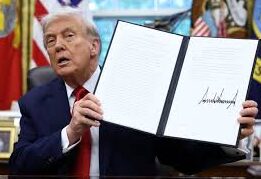US inflation picked up in August at its fastest pace this year, landing just days before the Federal Reserve meets to decide whether to cut interest rates.
Consumer prices rose 2.9% over the past year, up from 2.7% in July, according to the Labor Department. The cost of cars, home furnishings, and groceries like tomatoes and beef all climbed.
The Fed has kept rates steady since last year, watching the impact of President Donald Trump’s tariffs on consumer prices. Trump has repeatedly slammed the central bank for not cutting rates as aggressively as the UK and Europe.
Markets expect the Fed to trim rates by a quarter point next week. The new inflation data likely won’t stop that move, but it could make policymakers more cautious about future cuts.
“Trump’s tariffs and immigration policies are showing up in the data and eroding purchasing power,” said Atakan Bakiskan, US economist at Berenberg Bank.
Trump has brushed off warnings that his trade policies are furling inflation. Since new tariffs kicked in last month, most imports now face taxes of 10% to 50%. Prices of tariff-sensitive items like clothing and household goods edged up in August, suggesting more companies are passing costs to shoppers.
Food prices, which often swing, also climbed. Tomatoes jumped 4.5% in August. About 70% of US tomatoes come from Mexico, which now faces a 17% tariff on exports to the US.
Inflation is not the only concern. The job market is showing cracks. Employers added just 22,000 jobs in August, far below expectations, while unemployment rose from 4.2% to 4.3%. The Labour Department also revised job growth lower by 911,000 for the year ending in March. Weekly jobless claims last week surged to 263,000, the highest in nearly four years.
Stripping out volatile food and energy, core inflation held steady at 3.1%.
“Inflation is a subplot, but the weak labour market is the main story,” said Ellen Zentner, chief economic strategist at Morgan Stanley Wealth Management. “That means a cut next week, and probably more after that.”
Trump has also lashed out at the Bureau of Labour Statistics, accusing its leadership of rigging job data against him. Last month, he fired the agency’s chief without offering evidence. The Labour Department’s inspector general has since opened an investigation into how the bureau collects and updates jobs data.






